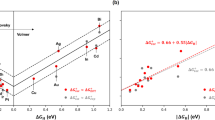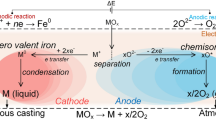Abstract
IN their communication under the above heading, Messrs. Le Brocq and Cocks1 redirect attention to a point that has been too often overlooked: namely, that the effectiveness of a metal as the cathode in a bimetallic corrosion system where hydrogen is evolved is dependent more upon the hydrogen overvoltage characteristics of the metal than upon its equilibrium single-potential in the electromotive series.
This is a preview of subscription content, access via your institution
Access options
Subscribe to this journal
Receive 51 print issues and online access
$199.00 per year
only $3.90 per issue
Buy this article
- Purchase on Springer Link
- Instant access to full article PDF
Prices may be subject to local taxes which are calculated during checkout
Similar content being viewed by others
References
Le Brocq, L. F., and Cocks, H. C., Nature, 156, 536 1945).
Hoar, T. P., J. Electrodepos. Tech. Soc., 14, 33 (1938). Met. Ind., 51, 649 (1937); 52, 87 (1938).
Evans, U. R., J. Franklin Inst., 209, 45 (1929).
Pourbaix, M., Chim. Ind., 41, 110c (1939).
Wagner, C., and Traud, W., Z. Elektrodiem., 44, 391 (1938).
Gatty, O., and Spooner, E. C. R., "The Electrode Potential Behaviour of Corroding Metals" (O.U.P., 1938).
Author information
Authors and Affiliations
Rights and permissions
About this article
Cite this article
HOAR, T. Hydrogen Overvoltage as a Factor in the Corrosion of Metallic Couples. Nature 157, 408–409 (1946). https://doi.org/10.1038/157408c0
Issue Date:
DOI: https://doi.org/10.1038/157408c0
Comments
By submitting a comment you agree to abide by our Terms and Community Guidelines. If you find something abusive or that does not comply with our terms or guidelines please flag it as inappropriate.



